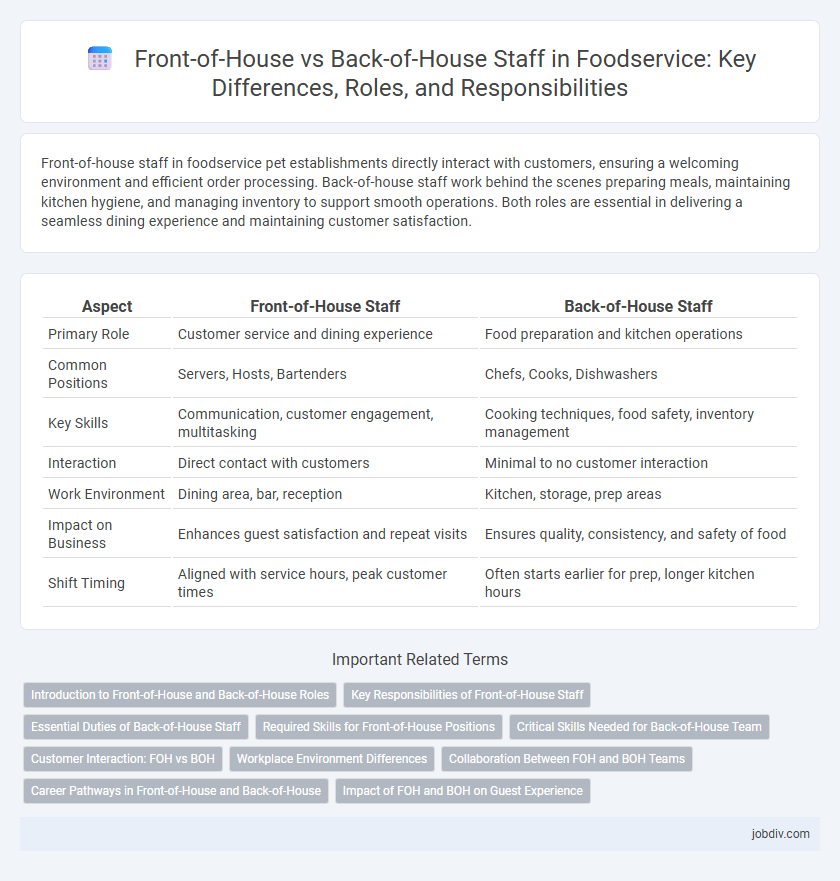Front-of-house staff in foodservice pet establishments directly interact with customers, ensuring a welcoming environment and efficient order processing. Back-of-house staff work behind the scenes preparing meals, maintaining kitchen hygiene, and managing inventory to support smooth operations. Both roles are essential in delivering a seamless dining experience and maintaining customer satisfaction.
Table of Comparison
| Aspect | Front-of-House Staff | Back-of-House Staff |
|---|---|---|
| Primary Role | Customer service and dining experience | Food preparation and kitchen operations |
| Common Positions | Servers, Hosts, Bartenders | Chefs, Cooks, Dishwashers |
| Key Skills | Communication, customer engagement, multitasking | Cooking techniques, food safety, inventory management |
| Interaction | Direct contact with customers | Minimal to no customer interaction |
| Work Environment | Dining area, bar, reception | Kitchen, storage, prep areas |
| Impact on Business | Enhances guest satisfaction and repeat visits | Ensures quality, consistency, and safety of food |
| Shift Timing | Aligned with service hours, peak customer times | Often starts earlier for prep, longer kitchen hours |
Introduction to Front-of-House and Back-of-House Roles
Front-of-house staff in foodservice primarily handle customer interactions, including roles such as hosts, servers, and bartenders who ensure a positive dining experience. Back-of-house staff focus on food preparation and kitchen operations, encompassing chefs, line cooks, and dishwashers responsible for meal quality and safety. Understanding the distinct responsibilities of front-of-house and back-of-house teams is essential for seamless restaurant operations and customer satisfaction.
Key Responsibilities of Front-of-House Staff
Front-of-House staff in foodservice are primarily responsible for customer interaction, including greeting guests, taking orders, and ensuring a positive dining experience. They manage table settings, coordinate with kitchen staff to relay special requests, and handle billing and payments efficiently. Exceptional communication skills and a strong focus on customer satisfaction are essential to maintain smooth operations and encourage repeat business.
Essential Duties of Back-of-House Staff
Back-of-house staff in foodservice primarily handle essential duties such as food preparation, cooking, and maintaining kitchen hygiene to ensure food safety standards are met. They manage inventory control, monitor food storage conditions, and coordinate with suppliers to maintain ingredient quality and availability. Their role is crucial in supporting front-of-house staff by delivering timely, well-prepared dishes that enhance overall customer satisfaction.
Required Skills for Front-of-House Positions
Front-of-house staff require exceptional interpersonal skills, including strong communication, customer service, and multitasking abilities to effectively manage guest interactions and ensure a positive dining experience. Proficiency in handling point-of-sale systems and a deep understanding of the menu are essential for accurate order taking and upselling. Adaptability, a polished appearance, and teamwork are also critical to maintain smooth operations and create a welcoming atmosphere in the restaurant.
Critical Skills Needed for Back-of-House Team
Back-of-house staff require critical skills such as culinary expertise, precise time management, and strong teamwork to ensure efficient kitchen operations and high-quality food preparation. Proficiency in food safety standards, inventory management, and equipment handling is essential to maintain a smooth workflow and compliance with health regulations. These skills directly impact overall customer satisfaction by delivering timely, consistent dishes that meet restaurant standards.
Customer Interaction: FOH vs BOH
Front-of-House (FOH) staff engage directly with customers, handling order taking, service, and guest experience to ensure satisfaction and prompt responses. Back-of-House (BOH) staff focus on food preparation, cooking, and kitchen operations, maintaining quality and efficiency without direct customer contact. Effective communication between FOH and BOH teams is essential for smooth service and meeting customer expectations.
Workplace Environment Differences
Front-of-house staff in foodservice typically engage directly with customers in a fast-paced, customer-oriented environment where communication and presentation are crucial, often dealing with high-stress situations during peak hours. Back-of-house staff work in a controlled, kitchen-focused setting emphasizing precision, safety, and efficiency while managing food preparation, cooking, and inventory behind the scenes. These differing workplace environments demand unique skill sets and workflows, with front-of-house roles centered on service and hospitality and back-of-house roles focused on culinary execution and operational consistency.
Collaboration Between FOH and BOH Teams
Efficient collaboration between Front-of-House (FOH) and Back-of-House (BOH) teams is crucial for seamless restaurant operations, improving order accuracy and enhancing the overall guest experience. Clear communication protocols, such as real-time order management systems, synchronize activities between servers and kitchen staff, reducing wait times and minimizing errors. Cultivating mutual respect and teamwork through regular cross-training sessions ensures both FOH and BOH personnel understand each other's challenges, fostering a unified service environment.
Career Pathways in Front-of-House and Back-of-House
Front-of-House staff, including servers, hosts, and bartenders, often advance into supervisory roles such as floor managers or guest service managers, leveraging strong interpersonal and customer service skills. Back-of-House staff, comprising chefs, line cooks, and dishwashers, typically progress through culinary and kitchen management careers, moving towards positions like sous chef, executive chef, or kitchen manager. Both pathways offer specialized training and certification opportunities that enhance career development and salary potential within the foodservice industry.
Impact of FOH and BOH on Guest Experience
Front-of-House (FOH) staff directly influence guest satisfaction through personalized service, ambiance management, and timely communication, creating an inviting dining atmosphere. Back-of-House (BOH) staff ensure food quality, consistency, and timely preparation, which are critical to fulfilling guest expectations and enhancing overall experience. The seamless coordination between FOH and BOH teams drives operational efficiency and elevates customer enjoyment in foodservice environments.
Front-of-House Staff vs Back-of-House Staff Infographic

 jobdiv.com
jobdiv.com